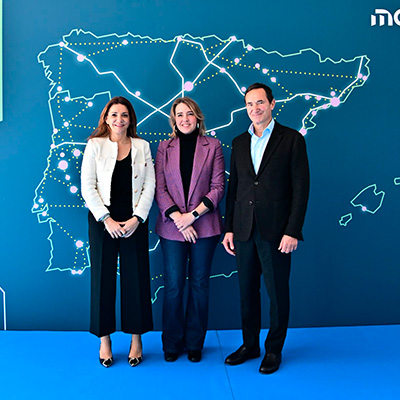- Generate more than half of EBITDA from sustainable businesses by 2030
- Reduce Scope 1 and 2 emissions by 55% and Scope 3 by 15-20% by 2030, among the most ambitious targets in the sector
- Reach net zero by 2050 and go beyond it to become Net Positive
- Invest between 7 billion and 8 billion euros, of which more than 60% will go towards sustainable businesses starting next year
- Create the largest e-mobility ecosystem and ultra-fast, on-the-go charging network in Spain and Portugal
- Transform its stations into digitally enabled ultra-convenience and food destinations
- Lead green hydrogen in Spain and Portugal with a production capacity equivalent to 2 GW and biofuels production of 2.5 million tons by 2030, and produce 0.8 Mt per year of sustainable aviation fuels (SAF)
- Develop a 7 GW renewable energy projects pipeline (solar and wind) to be dedicated to its own use, of which 1.5 GW already have grid connection
- Position Energy Parks in Andalusia as European gateways for hydrogen exports
- Provide greater autonomy to Chemicals and E&P divisions to maximize their potential to create value
Related videos

“At Cepsa, we are embarking on an ambitious journey to transform our company and be a key driver and enabler of the energy transition. Cepsa is small enough to move fast yet big enough to be a leader in creating a greener, more just and more sustainable economy. We will partner with our customers to develop decarbonization solutions for their energy needs, and of course address our own footprint as well. Green molecules are essential for the decarbonization of complex sectors such as heavy transport, aviation and maritime traffic and Cepsa has a competitive advantage thanks to its many years of experience in the production and handling of this energy source. Cepsa also has a highly qualified and committed team, and strategically located energy parks in the south of Spain that offer optimal conditions for the development of green molecules and green electrons that will help create a world in Positive Motion. There is no question that these are uncertain times, with the war in Ukraine upending the lives of millions of people and destabilizing global energy markets. The strategy we are presenting today is a long-term plan that reflects the historic opportunity that Spain and its energy companies have to become key players in promoting and producing clean energy. This will help strengthen Europe's energy security and independence, and I am confident that Cepsa can take a leadership role in this process”.
Maarten Wetselaar - CEO of Cepsa
Cepsa today presented its new 2030 Strategy, 'Positive Motion', to become a leader in sustainable mobility and energy in Spain and Portugal, and a benchmark in energy transition. With this strategy, the company will focus on the needs of its customers, who face their own challenges in decarbonizing their activities.
The company will invest between 7 billion and 8 billion euros this decade, of which more than 60% will be allocated to sustainable businesses as of 2023. This will translate into a greater contribution of sustainable businesses to EBITDA, rising from 14% in 2022 to more than half in 2030.
Cepsa wants to go beyond net zero to Net Positive, enabling customers and society to move in the right direction. The company has set an ambitious roadmap to cut its emissions, placing itself among the benchmark companies in its sector. Specifically, by 2030, it will reduce its CO2 emissions (Scope 1 and 2) by 55% compared to 2019 and become carbon neutral by 2050. As for Scope 3, the carbon intensity of its products will be reduced by between 15-20% in 2030.
The company's new business ethos ('Positive Motion') will be structured under two ecosystems: Sustainable Mobility & New Commerce, and Sustainable Energy. Both divisions will be fueled by its Energy Parks and alliances with strategic partners.
Sustainable Mobility & New Commerce
Under Cepsa's new strategy, the decarbonization of road transport and end-customer mobility will play a key role. The company will build the largest e-mobility ecosystem in Spain and Portugal, together with Endesa, that will meet customers’ charging needs whether at home or on the road. The plan will create an ultra-fast, on-the-go charging network with at least one 150 kW charger every 200 kilometers on key inter-city corridors.
It will also foster demand for green hydrogen in commercial road transport by placing hydrogen refueling stations every 300 kilometers across all the main road transport corridors connecting Spain to Europe by 2030.
Cepsa's service stations – which encompass the second largest network in Spain and Portugal – will be transformed into digitally enabled ultra-convenience and food destinations offering a variety of services including fresh food, pharmacy, e-commerce & delivery and sustainable car washing, alongside multi-energy on-the-go refueling options.
In addition, Cepsa will create a data-driven culture using advanced analytics to transform customer experience and boost its loyalty program. And through artificial intelligence (AI) decision-making, the company will be able to provide end-to-end services in real time.
Sustainable Energy
The second major ecosystem under Cepsa’s new strategy will focus on accelerating the decarbonization of customers in industry, air and maritime transport, as well as the company itself through the production of green molecules, primarily renewable hydrogen and biofuels.
Cepsa, currently one of the main producers of hydrogen in Spain, will lead green hydrogen production in Spain and Portugal by 2030 with a capacity equivalent to 2 GW and will become a key player in the import and export of this energy between Europe, Africa and the Middle East thanks to the strategic location of its facilities on the Iberian Peninsula.
Similarly, its deep experience in energy production and supply and its technological know-how will enable the company to lead second-generation biofuels production of 2.5 million tons per year by 2030, thus promoting the circular economy. In this area, Cepsa will become a leading supplier of Sustainable Aviation Fuel (SAF) with an annual production of 0.8 million tons. Cepsa currently supplies 35% of the Spanish aviation sector’s energy needs.
Transforming refineries into Energy Parks
To carry out this new strategy, Cepsa will convert its traditional refineries into diversified and sustainable Energy Parks. These sites are strategically located in southern Europe next to major ports, giving large industrial customers prime access to key markets.
The company will also implement technologies based on AI and advanced analytics to optimize its processes and reduce the environmental impact of its industrial centers.
In addition, Cepsa will develop a portfolio of solar and wind energy projects mostly dedicated to its own use. These renewable energy projects will have a capacity of 7 GW, of which 1.5 GW are already connected to the grid.
Accelerating value creation at Chemicals and E&P
The strategies of the Chemicals and E&P divisions remain unchanged. Under the plan, Cepsa will provide greater autonomy to the Chemicals and E&P divisions in order to maximize the creation of value in these businesses and allow for increased focus and faster decision making.
The Chemicals division will strengthen its global leadership in the LAB (key ingredient in laundry surfactants) and phenol (building block for all key engineering plastics) markets by developing and producing chemical products from renewable and recycled raw materials. The Chemicals business aims to derive up to 30% of its sales from low-carbon products and chemical products from renewable and recycled raw materials by 2026.
Meanwhile, greater autonomy in the management of the E&P business will be key to generating cash flows to facilitate the group's transformation. The company will also continue to optimize its exploration and production activity to reduce CO2 emissions intensity through efficiency measures and low-cost, low-carbon production.
ESG
Cepsa has a firm commitment to environmental, social and governance policies. To underscore this commitment, the company has linked executive remuneration to ESG objectives, with 15-25% of C-suite executives’ variable salary to be based on meeting these targets.
In terms of the United Nations’ 2030 Agenda, Cepsa has established four Sustainable Development Goals (SDGs) as priorities: SDG 7(Access to affordable and clean energy), SDG 8 (Decent work and economic growth), SDG 12 (Responsible consumption and production), and SDG 13 (Climate action).
Recently, some of the main sustainability rating agencies have recognized Cepsa as a top performer in its industry. The company was ranked by Sustainalytics as the #1 independent O&G company globally and by S&P CSA (Corporate Sustainability Assessment) as first quartile in the energy space.




